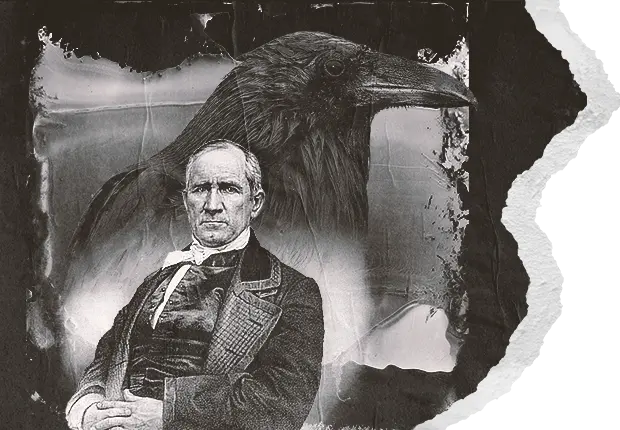A Raven’s Journey: The Life and Times of Sam Houston
Sam Houston is justly famous as the founder of Texas, first as a republic, and then, after nearly a decade of independence, as a state in the Union. But carving a country from the ashes of the Spanish Empire in North America then gifting it to his homeland was neither the first nor the last epic deed of Houston’s life. In an age of frontier legends Houston was in a class of his own, less an American than an Homeric hero, a comparison he would have recognized. He combined in equal parts the virtues of the civilized man and the barbarian, Christian chivalry and pagan areté, into a whole that was romantic enough to be implausible were it not so well documented. That his life is not better known to the average American is a crime.
Houston was born in Virginia in 1793. His family were Scots-Irish, of distant noble lineage from Clan Houston in the Borderlands. His own circumstances were modest. His father was a militia officer of middle rank who was rich in offspring but not money. When he died, his will stipulated that his estate should fund his family’s relocation to a more affordable frontier setting, and thus the Houstons picked up stakes and moved to Tennessee, where Sam would grow up.
It was clear that this middle son was different. Life in the backcountry near modern Maryville was difficult and all hands were needed, but Sam had little inclination for farming. His older brothers tried to make him work in the family store, equally to no avail. He wasn’t lazy exactly— he could hunt and fight and even as a teen was already physically imposing. Nor was he dull. Despite schooling being wasted on him he read every book the family had or else could get ahold of. But Sam Houston, it seemed, was simply incapable of sustained, tedious effort of the sort needed to make a farm or a business work.
He began to disappear, first for a day or two, then for longer. Finally, he just stopped coming home. Fearing the worst his brothers went in search of Sam, only to discover that he’d found a more convivial environment. At 16, Sam Houston had moved in with the Cherokee.
There was a great deal of prejudice against the Indians among whites of the day, but for a certain kind of white man the life of an Indian held profound attractions. Anglo Moralists would decry the fact that the braves left agriculture for women and spent their days in various sporting and marital activities—a portrait of a lifestyle that had less than the desired effect on young Houston. For him, the Cherokee were less indolent savages and more the aristoi from the Iliad, an epic he would eventually commit to memory.
Houston was adopted by Oolooteka, chief of the Tennessee band of Cherokee, who gave him the name Coloneh, or Raven. He learned their language and ways. He sat at the feet of their medicine men and heard their ancient myths sung to him as if from the rhapsodes of old. He was good at the things an Indian man was esteemed for, a success on the ball field and at the council fire, a hunter and a fighter. The women liked him a great deal as well. Though he would go back to Maryville in 1812 and live again as a white man, Houston would move back and forth between his identities for most of his life, a complicated racial overlap befitting a profoundly unique man.
1812 was a pivotal year for America, but for Houston, he needed a job, so he decided to troll his community by opening a school with himself as the teacher. To general surprise, he proved a success, and later remarked that of all his roles he enjoyed teaching the most. But the 1813 Fort Mims Massacre brought home the war then being waged with Britain. Perfidious Albion had allied with various native tribes on the frontier, including the Red Stick faction of the Creeks. After determining that his Cherokee brothers were supporting the US, Houston enlisted in the army, and marched off under the command of the Major General of the Tennessee Militia, Andrew Jackson.
Jackson would play a major role in Houston’s rise, both as a patron and a surrogate father, much like Oolooteka. He came to his commander’s attention in his characteristic way. At the terrible Battle of Horseshoe Bend, Houston, already promoted to junior officer, led the charge against the Red Stick fortifications, taking a hemorrhaging arrow wound in the thigh for his efforts. Ordered to retire by Jackson personally, the general was surprised to see Ensign Houston limping into yet another charge, which resulted in his being shot and his arm permanently crippled. Now on the verge of death, he’d at least gotten noticed.
Houston managed to recover from his wounds and was rewarded by being allowed to remain in the army after the large-scale demobilizations following the war, though encounters with officialdom would lead him to resign his commission after a few years. He would always have a difficult time walking a path blazed by others. But Jackson didn’t forget him. Houston returned to Tennessee, this time to the new capital of Nashville. He had decided to read law, and his patron assigned him a course to be completed in eighteen months. The man who’d memorized Homer by moonlight finished in six, passed the bar, and became a prominent attorney. Jackson secured for him the post of district prosecutor, and the former teen truant and runaway became an enforcer of law and order. He quickly became well-known. It wasn’t long before he began to win offices, including the coveted post of Major General of the Tennessee Militia, once held by Jackson. He got elected to Congress. He made friends in Washington too.
Jackson would lose a controversial election for president in 1824 to John Quincy Adams, but bounced back to victory in 1828, winning again in 1832. He put his stamp on an age, a man born in a frontier cabin elevated to the highest office in the land. Houston was along for the ride. With Jackson’s continued support, Houston was elected Governor of Tennessee in 1827. He was clearly being groomed as Jackson’s successor.
Then Houston blew it all up in one of the most bizarre and mysterious episodes in American history. Houston decided to marry in the midst of his reelection campaign to a girl of 18 named Eliza Allen. Exactly what happened is unclear, but after eleven weeks the marriage fell apart. Houston left his wife with her family, resigned the governorship, and departed Tennessee to live in Arkansas. Neither he nor Eliza ever explained why, and the public was left mystified and scandalized. The Allen men waylaid Houston on a steamboat and demanded that he address the obvious inference that their sister had been unfaithful. Houston declined to make a public statement but told them that if anyone challenged his wife’s purity he would return to Tennessee and “write the libel in his heart’s blood.” Gossips understood him to be serious.
There are theories as to why this happened. Occam’s razor suggests that the young bride simply wasn’t in love with Houston and married him at the behest of her ambitious family. Others suggest that Houston had been erratic in the weeks leading up to the split. There was always a touch of the manic-depressive in Houston, a man prone to grandiose schemes and deep melancholies. But another psychological explanation suggests itself. Houston could see his destiny clearly laid about before him—re-elected governor, president, elder statesman, respectable citizen all around. Something about that so repulsed him at a visceral level that he sabotaged any chance it could possibly manifest. He simply couldn’t bear to live a conventional life no matter what it promised. This flummoxed Jackson, but Houston was Jünger’s very anarch: power to him was never anything more than the means to self-realization. He’d carve out his own kingdom and place a crown on his own head. He’d make his own destiny.
Self-exiled from white society he made his way home to his red father, Oolooteka. He rejoined the council house. He drank and dreamed, both in excess. His bipolar mind lurched between spells of inebriated brooding (the Cherokee gave him the additional name of Ootsetee Ardeetahskee—“Big Drunk”) and feverish scheming. 1830 marked the formal commencement of the removal of Indians remaining east of the Mississippi to new territories near the Cherokee, and Houston found himself in great demand as a negotiator dealing with corrupt Indian agents. As evidence of his commitment to his new life, he had himself formally added to the tribal roster, making him legally an Indian, which amounted to a renunciation of US citizenship. He made the rounds of the other tribes, even former enemies like the Creek and wild frontier hostiles like the Commanche held him in esteem. In another universe Sam Houston founded a great tribal confederation, with everyone from the distant Cheyanne and Apache to the fierce exiled Choctaw and his own Cherokee united under one great banner, a frontier Khan at the head of a formidable Native States of America.
But it was not to be. Houston was pulled back into the orbit of US politics by an incident only he could precipitate. In 1832, while in Washington on a diplomatic mission for the Cherokee, Houston was incensed to discover that a congressman named William Stanbury of Ohio had accused him of fraud in his work for the Indians. Houston sent letters requesting a duel, and when Stanbury declined to respond, Houston tracked him down in the street and thrashed him with his heavy hickory walking stick (cut from a tree in Jackson’s yard, as it happened). The House of Representatives held a sort of trial as to whether to censure him for the assault. Houston hired Francis Scott Key (of Star Spangled Banner fame) as his defense attorney, but did most of the talking himself, giving a stemwinding speech best described by his great biographer, Marquis James:
Houston spoke for half and hour on the perils of legislative tyranny. He mentioned Greece and Rome. The errors of Caesar, of Cromwell, of Bonaparte and of “the Autocrat of all the Russias” were displayed. Blackstone and St. Paul were found to be on the speaker’s side.
While they were moved, Houston was duly reprimanded, which amounted to the House Sergeant at Arms telling him, “You are reprimanded.” Nonetheless, the incident brought him back into the public eye in a positive way, as assaulting Yankees was always a crowd-pleaser among certain constituencies. Jackson had never abandoned him, and they grew closer. They’d both been thinking along similar lines those past few years, as it happened, each man’s plans intersecting in Texas.
Texas was both the wild western frontier of the expanding US and the moribund northern expanse of the unstable new nation of Mexico. Further abroad were the Commanche, the powerful horse-empire whose braves thought nothing of riding a thousand men deep into Mexico, looting and pillaging, confident that no one could follow them back into their prairie fastness. Partly for that reason, both New Spain and Mexico had been inviting Americans to settle there as a buffer. But Texas was uneasy. Mexico forbade slavery and mandated conversion to Catholicism. The settlers preferred the opposite arrangement. And there were factions forming. While the older settlers came as families and preferred ordered life under Mexican rule, there were newcomers who seemed hot for rebellion. The latter sentiment was encouraged by the Jackson administration, which sought repeatedly to buy the territory. It was into this cauldron of intrigue that Houston arrived.
Houston thought independence was a fine idea as a temporary measure but ultimately that Texas belonged in the US. Behind the scenes he sought to organize things, give order to sentiments of Texas patriotism. But events quickly forced his hand. The Mexican government collapsed once again into dictatorship at the hands of the colorful General Antonio Lopez de Santa Anna, and radicals in Texas took this as their opportunity to shake off what they regarded as autocratic rule, declaring independence in 1835. Without much in the way of an army, Houston knew that bluster would avail the Texans little against the Mexican government; for all his peacocking Santa Anna meant business. Houston found himself named commander-in-chief despite his misgivings (and lack of field command experience) and quickly sought to bring order to the situation.
Santa Anna marched north. He crushed the defenders at the Alamo. He wiped out the men of Goliad. Refugees fled from the path of his ten-thousand man army. Houston’s response was to retreat. Mutineers murmured against him. He ignored them and pulled back all the way to the San Jacinto river.
There was a method to his Fabian strategy. Santa Anna needed to destroy Houston to win, but first he had to find him. Than meant dividing his own forces in unknown country. It left him vulnerable to defeat in detail; but what did the Napoleon of the West fear from a half-Indian frontier braggart? He was so confident that he settled his forces down for a siesta near that same small river as Houston, though he little suspected the latter was nearby. Houston pounced on Santa Anna while his men lounged with stacked arms, his own 700 or so routing the 1,500 or so regulars the general had with him there. Houston took a bullet to the leg that nearly killed him in the charge. Santa Anna himself was captured shortly thereafter. He signed a treaty promising to recognize Texas independence.
Houston was the hero of the hour and the new country rewarded him with both its presidency and a capital named in his honor. He remains the only American governor to become a foreign head of state. He’d sought his own path and followed it, but it wasn’t over yet. Houston’s larger goal was to incorporate the Republic of Texas into the US. This was finally achieved in 1845, the news rushed to the dying Jackson.
The annexation of Texas set in motion events that would tear the country apart. Mexico disputed the border and the two nations went to war in 1846. A generation of American junior officers learned skills they would turn on each other in fewer than twenty years. The result was the acquisition of not only Texas, but nearly half of Mexico—all of its territory north of the Rio Grande. This triumph was a poison pill, for it foregrounded all the carefully buried issues around slavery. Houston was in the middle of it; with his citizenship restored, he was sent to the Senate by Texas, the only former foreign head of state to serve there.
Houston was a misfit as always. He was a Southerner and a lifelong slave owner, but thought the issue was a silly thing over which to tear the country apart. His moderation won him few friends. He was first a Democrat, then a Whig, then a Know-Nothing, then simply nothing, representing Texas in the Senate as an independent. He lost his seat. His continued advocacy for the Indians made him increasingly unpopular in Texas, especially after the Republic had turned on the Cherokee—Oolooteka dying in battle against Texas at 84. Houston called the Texans who fought him murderers at a public meeting. He failed a re-election bid for governor, his only election loss. The mismanagement of his predecessor allowed him to retake the office in 1859, just in time for the cataclysm.
Abraham Lincoln’s election in 1860 led seven states to secede from the Union. Texas was one of them. Houston held that it was legal to leave the Union and revert to being a sovereign republic, but that the secession convention could not bind the Republic of Texas to the Confederacy. This moderate but somewhat convoluted reasoning satisfied no one. He was voted out of office in an emergency election; Lincoln offered to send troops to maintain his authority, but Houston declined. He foresaw what would happen and had no wish to add to the death toll to come. Houston left quietly and would never hold office again.
His life was fuller in other respects. After the legal formality of a divorce from Eliza, Houston, then 47, had married Margaret Lea, the 21-year-old daughter of an Alabama planter in 1840. With a maturity than belied her years, she knew exactly what she was getting into with the man everyone warned her about. But something about the intensity of the old warrior was irresistible to her. She was a steadying influence in his life and led him to his final transformation. In 1854, Sam Houston knelt before the altar at the Independence Baptist Church and declared that he wished to be forgiven for his sins. Rufus Burleson, President of Baylor University, performed the baptism in a nearby stream before a crowd of very curious onlookers.
Why then? Houston was by that point a father of eight and just over 60. Like Jünger, like his near contemporary Bedford Forrest, like so many men of action, the ebbing of life’s tide concentrated his mind on the limits of vital power. He’d had more life than most other men could imagine and could only be that much more conscious that it was coming to an end. He began to turn from the temporal to the eternal. His restless heart sought ease at last.
He lived to hear of his oldest son being severely wounded at Shiloh, and lived long enough to praise God for his boy’s recovery. Sam Jr. would go on to be a doctor and a man of peace. Sam Houston himself passed away after illness in 1863, the fate of Texas still undecided. The Raven flew home.

































